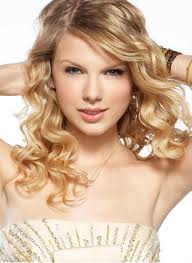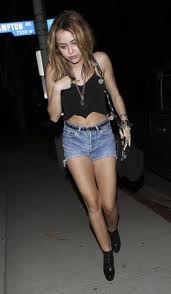I nanny a twelve year old girl and her older brother. They are both bright, friendly and pretty well behaved; I love my job.
12 had a vocal recital at her school this week and I went along to witness the effect that very expensive private tuition can have on aspiring starlets.
Three of the five performers (including My Girl) chose songs by Taylor Swift. Three.
One sang Miley Cyrus and the last, Adele.
When I poked gentle fun at 12 after the recital, she felt compelled to defend her decision – saying repeatedly that Taylor Swift was A Good Role Model.
Miley Cyrus on the other hand, is apparently not.
Taylor Swift as an appropriate consumer product for 12 is not a new topic in her household – last year she was allowed by her mother to attend Swift’s concert for that reason whilst being banned from Katy Perry by the same logic.
to attend Swift’s concert for that reason whilst being banned from Katy Perry by the same logic.
I cannot disagree with a mother’s decision to prohibit the latter given sexualisation of Perry’s stage presence (she is twelve after all), but I railed against the quick condemnation of Miley for, let’s face it, behaving like a perfectly ordinary teenager.
12 and I had also recently engaged in an argument over Justin Bieber and the fact that she did not ‘like him anymore’ because he ‘did drugs’.* I’m pretty ambivalent to The Biebs, being well past the age where floppy-haired, baby-faced teen popstars graced the walls of my bedroom, but this particular discussion was about not believing every single rumour the media cooks up and provides only a thin veneer of severely skewed evidence for, so I defended him.
She also expressed her disinclination to like The Veronica’s any longer last year, because ‘they are all yucky and have tattoos now’.
Back to Taylor. I like Taylor Swift pretty well. She has catchy pop tunes and really amazing hair.
Up until now I have been on board with the idea that she is a Positive Role Model for Young Women, and I still think she has a lot to offer. She writes her own songs and is genuinely talented in an industry full of auto-tune and even though she is undeniably beautiful, she seems to committed to getting by on that talent (wikipedia tells me that she refuses to take part in sexualised photo-shoots).
There is definitely a case for her lyrics and videos endorsing the whole purity/virginity/helpless damsel deal (I really enjoyed reading this article that cuts right into her) but I want to talk about HER image here; Taylor as an actual live human being. If she wants to avoid alcohol and not get her tits out for FHM, then that’s her prerogative.
My argument is that by censoring and censuring the ‘role models’ available to young we:
a) prevent and avoid discussions about diversity
b) fail to facilitate conversations about choices and stigma
c) endorse the Madonna/Whore paradox for young women
Miley Cyrus led me to this, so let’s work with her. So she drinks and parties and probably makes questionable clothing and/or party pash choices. Why does that sound familiar? Oh wait, it’s because THAT’S EXACTLY WHAT I DID when I was in my late teens (read:  continue to do, albeit with less frequency and stronger hangovers).
continue to do, albeit with less frequency and stronger hangovers).
I have issues with the culture of binge drinking in Australia, and I don’t endorse reckless behaviour (particularly the unprotected variety) but it would be super-naive and extremely hypocritical of me to criticise a teenager for behaving like a teenager.
Of course I want 12 to wait several more years before even looking at a pint glass, but when the time comes, I would encourage her to enjoy her late highschool and university years. If she chooses to do that by joining her friends at the pub, well good. If she decides to go the full Swift, also good.
By simply labeling teen icons like Cyrus or Swift good or bad, we avoid a vital conversation about agency, consequences and stigma. I think it is far more important for girls to learn about making choices they are comfortable with preparing them for the many social pressures they will face. Alcohol, drugs and…let’s call it ‘hoodlum mentality’ for bonus kitsch, are going to be a part of their lives no matter which path they choose for themselves, but relegating certain behaviours to a spectrum of evil does nothing to help them negotiate the pros and cons of that world.
I also think that allowing stereotypes concerning physical appearance or ‘lifestyle choices’ (read: tattoos) to determine the pre-teen social value of a celebrity is one step away from straight up bigotry. As someone with tattoos, I was under the impression that the (obviously sad) but inevitable death of the baby boomer generation would free up a lot of the freak factor generally allotted to those demon spawn besmirched by ink. Hearing a twelve year old disparage the virtue of performers she admittedly used to like because they put some pictures on their skin made me feel pretty low.
Once again I feel the good/bad role model mechanism at work. Parents utilise it in this situation because they don’t want their kids to get tattoos, but they are also encouraging their kids to discount people on the basis of appearance, and of difference.
Finally, the Swift/Cyrus dichotomy reeks of Madonna/Whore to me.
This mutually exclusive distribution of teen behaviour seems to me to offer girls but two options for gaining attention and approval once they hit their teenage years: be a white, middle class virgin with shitloads of talent and amazing hair OR get drunk and ‘forget’ to wear underwear every now and again.
Obviously it is not my place to define ‘good’ and ‘bad’ for every twelve year old in the country, but I would encourage parents, sibling and other peers and caregivers to be less hasty with those labels. After all, we are their real role models, and defining our own behaviours (and what will come to be, for most, normal behaviours in later years) as either intrinsically plus or minus in the morality meter can only end with confusion, uniformed choices and misplaced guilt.
*Apparently there was a picture of him with cigarette. I made a pretty half-hearted attempt to find it, and couldn’t.
